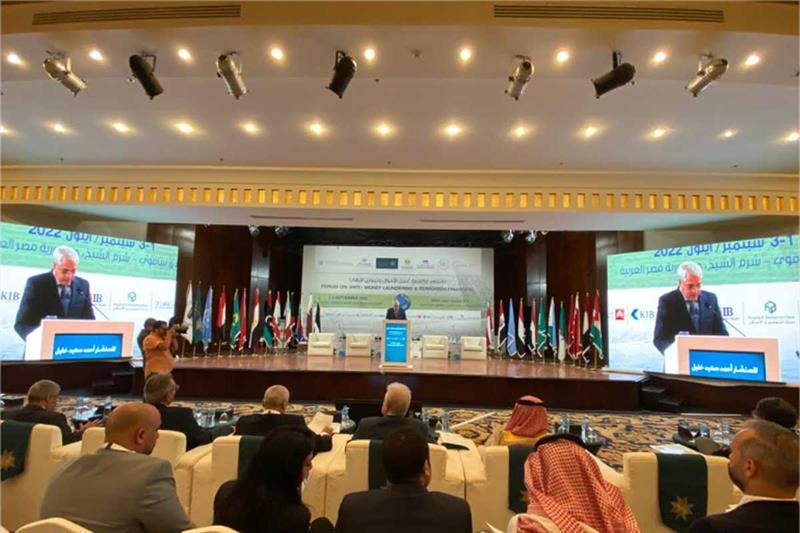
Chairman of the Egyptian Money Laundering and Terrorist Financing Combating Unit (EMLCU) Judge Ahmed Said Khalil addressing Anti-Money Laundering and Terrorism Financing Forum in Sharm El-Sheikh on Thursday.
Khalil’s remarks came during his speech at a Forum on Anti-Money Laundering and Terrorism Financing, held in Sharm El-Sheikh on 1-3 September, state-owned news agency MENA reported.
The three-day event is organised by the Union of Arab Banks in collaboration with the Central Bank of Egypt (CBE) and the participation of more than 350 banking experts from 16 Arab and Western countries.
The UN Office on Drugs and Crime (UNODC) estimates the volume of criminal proceeds laundered globally each year at about $2 trillion, which is more than 10 times the volume of development aid received globally, according to statistics issued by the World Bank in 2020, the EMLCU chairman said.
The EMLCU is an independent unit at the CBE established in 2003 under the money laundering law.
Egypt's hosting of this forum comes in response to the continuous development of the mechanisms used to commit these crimes, said Khalil, adding that the country is aware that confronting these crimes is not an easy task that requires intensive cooperation and diligent effort at the national, regional, and global levels.
The forum addresses the risks of financial crimes that have surged in light of increasing attempts by criminals and organised criminal groups to penetrate the financial and economic systems to legitimise their criminal proceeds and in light of the attempts by terrorists and terrorist entities to execute their plans without being tracked, according to MENA.
Khalil noted that Egypt is constantly keen to take all the measures to confront these crimes in line with developments in international standards and best practices.
Egypt has witnessed a noticeable increase in the number of internet users since the emergence of the coronavirus pandemic. In January 2022, Egypt had around 76.9 million internet users up from the 50.4 million reported in January 2021, according to a report issued in March 2022 by the Ministry of Communication and Information Technology.
In light of the growing number of internet users, Egypt – which was selected as vice chair of UN cybercrime ad hoc committee in 2021 – has adopted several measures to combat illicit financial flows as part of the country's efforts to combat money laundering and the financing of terrorism and has also coordinated with international partners in this field.
Earlier this year, Egypt's House of Representatives approved government-drafted legislative amendments to the 20-year-old anti-money laundering law (Law 80/2002) aiming to set up an independent anti-money laundering unit.
Egypt has also adopted a national strategy to combat terrorism and its financing, which takes into consideration the international and local developments that occur in this field with Egypt deeming combating terrorism financing as one of the policy objectives of the state.
In 2018, Egyptian President-Abdel Fattah El-Sisi ratified an anti-cybercrime law, which places hefty fines and prison sentences on hacking state information systems as well as crimes via information systems and technologies and crimes related to emails.
The 45-article law, titled “Anti-Cyber and Information Technology Crimes”, is also concerned with combating extremist and terrorist organisations using the internet to plan for terrorist attacks.
Short link: